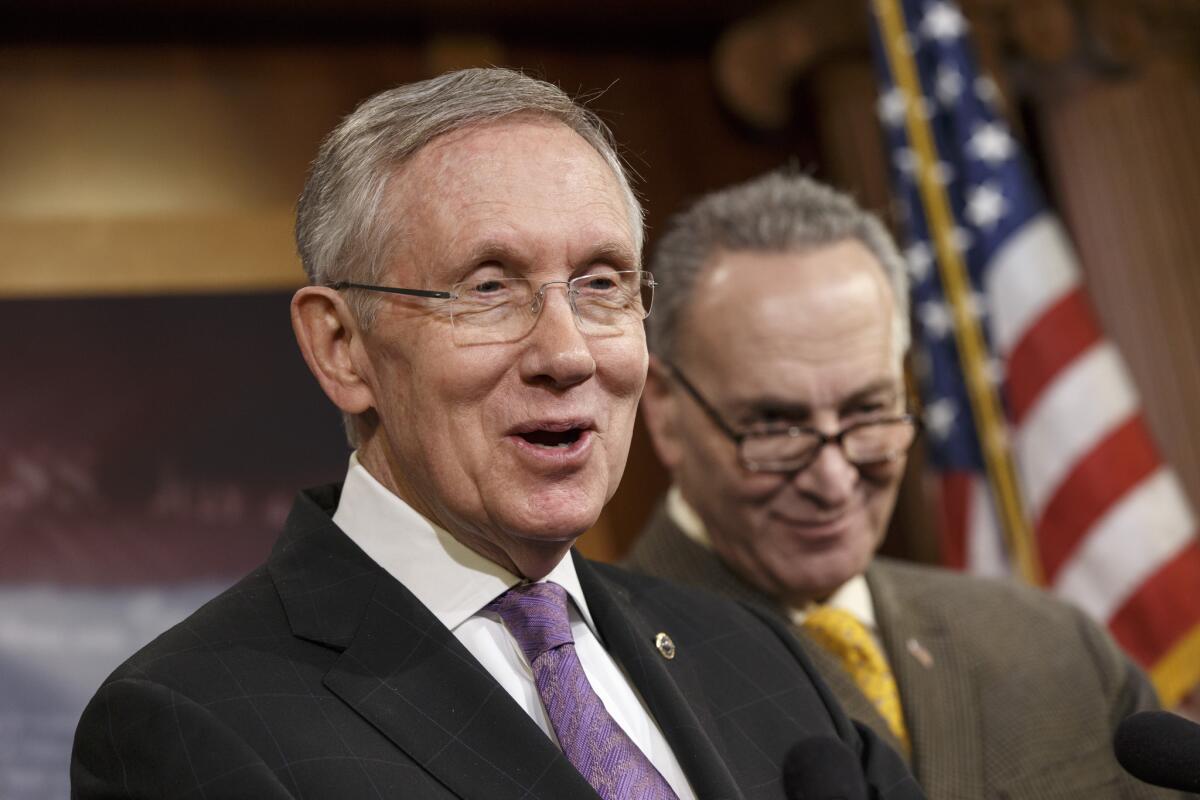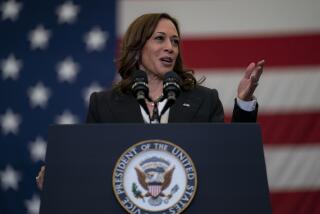With Schumer endorsement, Democrats hope to avoid leadership fight

Senate Majority Leader Harry Reid (D-Nev.), left, joined by Sen. Chuck Schumer (D-N.Y.), talks to reporters at the Capitol in this 2013 file photo.
Retiring Sen. Harry Reid’s quick endorsement of New York Sen. Charles E. Schumer as the next Democratic leader in the chamber could be an early signal he hopes to avoid what could be a contentious battle for a rare opening in party leadership.
While Reid’s endorsement – and that of the current No. 2 Democrat, Illinois Sen. Richard J. Durbin -- is important, it by no means guarantees Schumer will glide into the post.
There hasn’t been an active campaign for the top Democratic leadership position in either the House or Senate since Reid won his current post in 2005. And beyond the pent-up desire of ambitious Democrats to climb the ladder, the kind of intra-party ideological battle that has dogged Republicans in recent years could now manifest itself between liberal and more centrist Democrats.
In an interview with the Los Angeles Times, Reid said the job is Schumer’s to claim, “if he plays his cards right.” The two spoke in person Thursday night to discuss Reid’s plan to step down.
“I told him if you need my help, you got it,” he said.
A spokesman for Durbin, who is now in his 11th year as the Democratic whip, said the senator also pledged his support to Schumer on Thursday night. Durbin plans to run again for the whip position, the spokesman added, and has Reid’s support in doing so.
Schumer is currently the No. 3 Democrat in the Senate, leading the party’s policy and messaging operation. He previously led the party’s campaign committee in 2006 and 2008, helping build what was briefly a 60-seat Democratic supermajority that was critical to advancing President Obama’s agenda early in his term.
But as a senator who represents Wall Street and has carved out a more business-friendly resume, Schumer may have difficulty winning the support of the increasingly powerful liberal wing of the party.
On the other hand, he could be a natural bridge for Democrats to a White House occupied by Hillary Rodham Clinton, whom he served with for eight years when she was also a New York senator.
Despite some reservations on the left, Schumer boasts a reliably Democratic voting record and has relished public battles with the GOP.
But behind closed doors he’s been just as zealous to negotiate with the opposition. He was a part of the Gang of 8 behind the 2013 comprehensive immigration reform bill that passed the Senate before stalling in the House. And at one point during that year’s battle over Senate procedural rules, it was Schumer who helped broker what was ultimately a short-lived cease-fire.
Schumer’s primary task at this point is likely shoring up support within his caucus and demonstrating that his party can be comfortable with him as its leading voice. Schumer’s reputation for aggressively courting media attention famously led Bob Dole to quip that, “the most dangerous place in Washington is between Charles Schumer and a television camera.”
That notoriety could make Schumer an easy target for Republicans as something of an East Coast version of Nancy Pelosi, the House minority leader and former speaker.
A dozen current Democratic senators were elected during Schumer’s leadership of the party campaign committee, and he has been a proven fundraiser, giving him political chits he could now cash in. But he was also an architect of Senate Democrats’ 2014 strategy that resulted in the loss of the majority.
In November, Schumer launched what he said would be a series of speeches on how Democrats could recover. But that initial offering attracted heavy criticism from some in the base, including close allies of Obama, when he said in November that it was a mistake for Democrats to pursue healthcare reform in 2009 and 2010.
Progressive groups reacted to Reid’s announcement Friday by promoting another potential leader: liberal champion Elizabeth Warren.
“The election for next Democratic leader shouldn’t be a slam dunk for any early front-runner, especially someone closer to Wall Street while the Wall Street wing of the party is dying and the Elizabeth Warren wing is rising,” said Neil Sroka, spokesman for Democracy for America. “It only makes sense that the next leader of the U.S. Senate is either from the Warren wing or deeply understands how to work with it.”
“Sen. Chuck Schumer has spent his entire career carrying water for Wall Street interests. Add to that his support for the Iraq and now a possible Iran war and it makes him a disastrous choice to lead the Democratic caucus,” added Becky Bond, political director for CREDO Action, another liberal group.
Warren was elevated in January to an informal role in Democratic leadership as a liaison to progressives. A more likely candidate could be Sen. Patty Murray of Washington.
Murray defied the political predictions by helping preserve the Democratic majority in 2010 as the party’s campaign chief. And she has earned praise for her stewardship of the Senate Budget Committee in the last Congress, helping broker a two-year budget agreement with Rep. Paul D. Ryan (R-Wis.).
The White House said Friday it would not weigh in on what could be a contested race. “It’s the responsibility of Democratic members of the Senate to decide who the Senate Democratic leader should be,” spokesman Josh Earnest told reporters.
Obama instead heaped praise on Reid as “not only an ally, but a friend. I’m proud of all we have accomplished.” He even surprised Reid by interrupting an interview he was conducting with a Nevada radio station.
“Harry is unique, and he’s got that curmudgeonly charm that’s hard to replace,” Obama said. But he talked about the symmetry of the two men leaving office at the same time. “The system works better when, over time, some new blood comes in. We’ve had a great run,” he said.
Reid indicated he was proud of their shared record.
“Never in the history of the country have we produced more for a president, and somebody that’s led his party, than we’ve done together,” he said, while also reflecting on their shared, unique backgrounds.
Reid’s decision against seeking reelection could free him as party leader to help advance some of Obama’s remaining priorities – not all of which are shared by Democrats universally. Were he to face a campaign as difficult as his 2010 reelection, Reid would need to ensure the enthusiastic backing of his Democratic base – something that might prompt him to rally opposition to trade deals opposed by unions, for instance. Reid has been seen as a potential obstacle to a House compromise measure to reform the Medicare reimbursement system.
But an open contest for leadership could lead others to step in as opposition, perhaps including Schumer.
More to Read
Get the L.A. Times Politics newsletter
Deeply reported insights into legislation, politics and policy from Sacramento, Washington and beyond. In your inbox three times per week.
You may occasionally receive promotional content from the Los Angeles Times.












